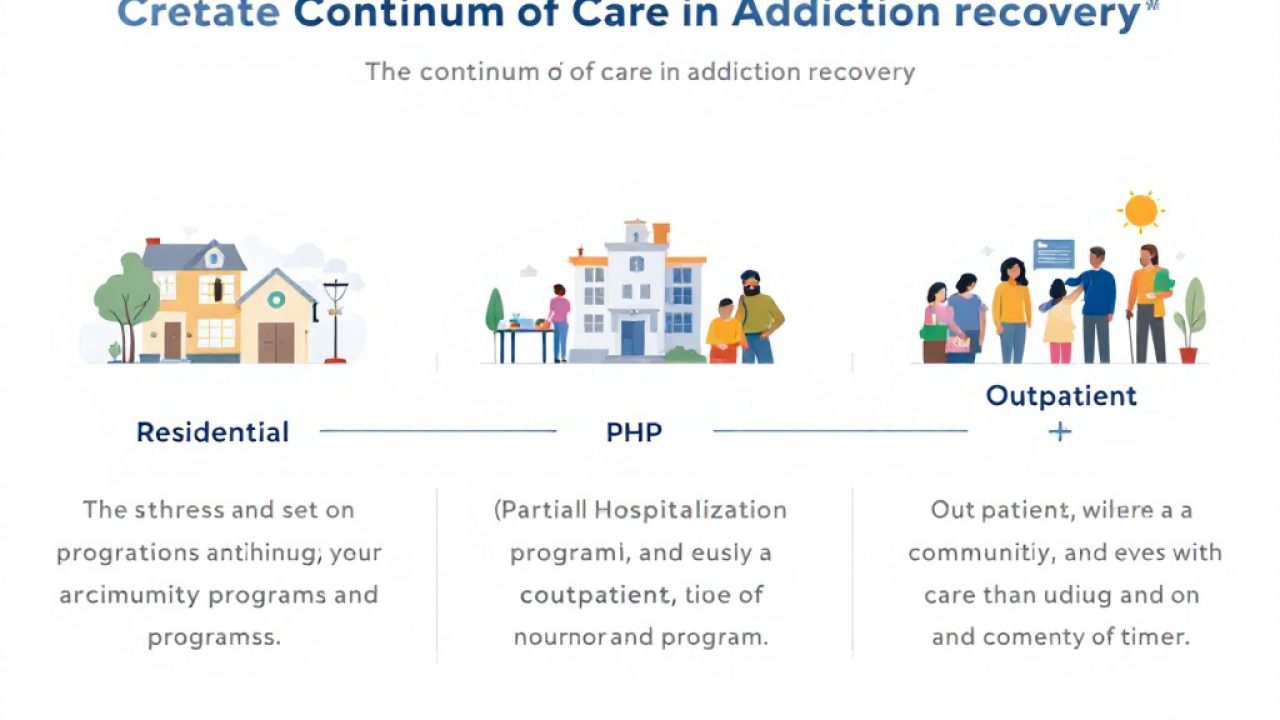You’re likely weighing your options and wondering how a continuum of care in addiction recovery can guide you from crisis to lasting sobriety. In Charlotte, NC, structured treatment options range from 24/7 residential programs to partial hospitalization and intensive outpatient services. Understanding how these levels of care connect—and which one fits your needs—can make all the difference in achieving sustainable recovery.
By tapping into a seamless continuum, you gain access to tailored treatment programs that adjust as you progress. Whether you start with medical detox or jump into an outpatient setting, each step builds on the last, ensuring you’re never left without the support necessary for lasting change.
Understand the continuum of care
What the continuum of care involves
A continuum of care in addiction recovery is a coordinated system of treatment levels that match your needs at each stage of healing. As defined by the American Society of Addiction Medicine (ASAM), this model moves you through five main levels—from medically supervised detox to ongoing community support—so you receive the right intensity of care at the right time [1].
Why the continuum matters
- Prevents gaps in treatment, reducing the risk of relapse and overdose [2]
- Encourages longer engagement, which correlates with better outcomes [1]
- Adapts as your needs evolve, from intensive support to community-based resources
- Reinforces recovery capital—your internal motivation and external support network—for sustained progress [3]
Compare care levels
Residential treatment
Overview
Residential, or inpatient, rehab provides 24-hour medical supervision and structured activities in a controlled environment. You live on-site, focusing solely on recovery without outside distractions.
Benefits and outcomes
- High level of safety during detox and early recovery
- Access to evidence-based therapies and holistic modalities in a group setting
- Strong peer support to build camaraderie and accountability
Who it suits best
Ideal if you:
- Face severe withdrawal risks or co-occurring mental health issues
- Have struggled with multiple relapses
- Need a break from triggers at home or work
Learn more about the difference between inpatient and outpatient rehab.
Partial hospitalization program
Overview
Partial hospitalization programs (PHP) offer a step down from residential care. You spend 4–6 hours per day, up to five days a week, in a clinical setting and return home each evening.
Benefits and outcomes
- Intensive therapy without full residential commitment
- Structured day with group therapy, individual counseling, and medical oversight
- Flexible enough to integrate family support and home responsibilities
Who it suits best
Best for those who:
- Require daily clinical support but have a stable home environment
- Hold work or school obligations
- Want to avoid the isolation of inpatient rehab
Explore a partial hospitalization program overview to see if PHP fits your needs.
Intensive outpatient program
Overview
Intensive outpatient programs (IOP) deliver 9–30 hours of treatment weekly, depending on your individual plan. You attend scheduled therapy sessions but live independently.
Benefits and outcomes
- Maximizes autonomy while offering core therapies and relapse prevention
- Encourages real-world application of coping skills between sessions
- Often leads into continuing care and community support groups
Who it suits best
Suitable when you:
- Have completed residential or PHP care and need the next step
- Maintain a supportive home environment
- Prefer a less disruptive schedule
Read about how intensive outpatient treatment works for more details.
Levels of care at a glance
| Level | Hours per week | Setting | Typical duration |
|---|---|---|---|
| Residential rehab | 24/7 supervision | On-site facility | 30–90+ days |
| Partial hospitalization | 20–30 | Clinical program, daily | 2–4 weeks minimum |
| Intensive outpatient | 9–20 | Outpatient clinic | 8–12 weeks average |
Choose the right program
Key factors to consider
- Severity of substance use and co-occurring disorders
- Your home environment and support network
- Work, school, and family responsibilities
- Insurance coverage and cost considerations
- Your treatment goals—abstinence or moderation
Working with your treatment team
A comprehensive assessment—guided by ASAM Criteria—helps you and your clinicians develop personalized treatment plans for recovery. This collaborative process ensures you engage in evidence-based addiction treatment options tailored to your unique circumstances.
Questions to ask
- What makes a good rehab program for someone with my history?
- How will you coordinate my care if I step down from residential to outpatient?
- What happens after completing rehab to keep me on track?
Use this guide on how to choose the right addiction treatment program to prepare for these discussions.
Ensure seamless transitions
Step-down care after residential treatment
Transitioning from 24/7 support to a less intensive setting can feel daunting. Step-down care after residential treatment bridges this gap, gradually reducing supervision while maintaining therapy and peer support. This approach lessens dropout risks and promotes steady progress [1].
Continuing community care
Continuing community care—also called aftercare—keeps you connected to mutual-help groups, case managers, or telephone-based checkups. Research shows that longer durations and active outreach through Recovery Management Checkups reduce relapse rates and foster lasting stability [4].
- Mindfulness-Based Relapse Prevention sessions
- Mobile health check-ins and reminders
- Regular meetings with a recovery coach or therapist
Resources and next steps
Finding programs in Charlotte, NC
Charlotte offers a range of options—from residential retreats to structured day programs and specialized outpatient clinics. Check out these resources for local support:
- Compare residential vs outpatient rehab in Charlotte NC
- Browse the best rehab programs in Charlotte NC
What to expect after treatment
After completing your program, you’ll engage in ongoing support to maintain your gains. This may include alumni groups, vocational counseling, or sober living arrangements. Knowing what to expect during outpatient rehab and beyond can ease the transition and reinforce your recovery capital.
Take the first step
Choosing a continuum of care in addiction recovery means committing to a pathway that adapts as you heal. At Nova Recovery Center in Charlotte, we offer all levels of care—residential, PHP, and IOP—within a clinically grounded, supportive environment. Our multidisciplinary teams guide you through each phase, ensuring you receive comprehensive care tailored to your goals.
Reach out today to learn how Nova’s structured continuum can empower you or your loved one toward lasting change.
References
- (NCBI Bookshelf)
- (The Recovery Village)
- (NLM)
- (PubMed)







